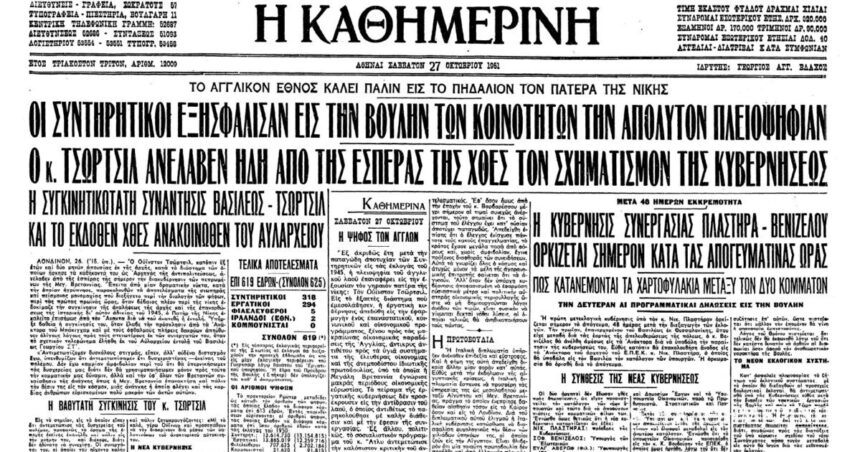In the early 1950s, the country’s political life was going through a period of crisis, with governments coming and going. In the elections of 9her September 1951, the dominant party was the first-appearing Hellenic Alarm of Alexandros Papagos, which, however, failed to gain independence. Papagos’ refusal to cooperate led, after 48 days, to the creation of a centrist cooperation government. Prime Minister was Nikolaos Plastiras of EPEK (National Progressive Union of the Center) and vice president was Sofocles Venizelos of the Liberal Party.
According to the front page of “Kathimerini” on the 27her October 1951, the new government would be sworn in in the afternoon after the return of King Paul from Thessaloniki. The climate was, as reported, not particularly good, due to the disagreements that existed between the two collaborating sides regarding the “revisionist character of the Parliament”. According to the relevant publication, “according to reliable information, the issue of the electoral system, with which the upcoming parliamentary elections will be held, will be dealt with by the Government immediately after the start of the regular work of the Parliament and before the House proceeds with its sanction new Constitution. […] As is well known, the two cooperating parties have different views regarding the electoral system, with which the upcoming parliamentary elections will be held. The Liberal party, on the other hand, is preaching in favor of the establishment of simple proportionality in order to be able to maintain its autonomy. And EPEK deviates in favor of the majority in order to force the other parties of the Center to merge with it”.
Nevertheless, the message of the new prime minister immediately after the inauguration of the government was one of unity. More specifically, in his speech, N. Plastiras said that what the people were asking for was “honest, impartial and loving administration”. What he promised was that there would be “equality before the law and respect for the public wealth will be the rule of my governmental endeavours”. Another issue, however, in a period of intense internal imbalances – the Civil War had ended just two years before – was justice and peace within the country. “Ask for justice and inner peace – and you will have them”, said N. Plastiras in his speech. “I can […] to assure you that my guideline will be to remove the injustices and soften the contradictions, so as to create among the Greeks a climate of unity and mutual mental tolerance”. Finally, for him the priority of his government would be the country’s international security. “Already the integration of Greece into the Atlantic community of free nations is a decisive step towards this direction. But also in the future, everything that will strengthen our national security will be our main concern”.
Ultimately, the government would remain in power for only one year, a period characterized by contradictory developments, with the most typical case being the passing of the new Constitution – one of the most conservative in Greece. At the same time, the pressure from the Americans was great, making the situation even more difficult. In the elections that followed, in November 1952, the Hellenic Alarm would gain self-reliance, ushering in the primacy of the Right in the years that followed. A central government would be created again in 1963 with the Center Union of George Papandreou.
Column editor: Myrto Katsigera, Vassilis Minakakis, Antigone-Despina Poimenidou, Athanasios Syroplakis





